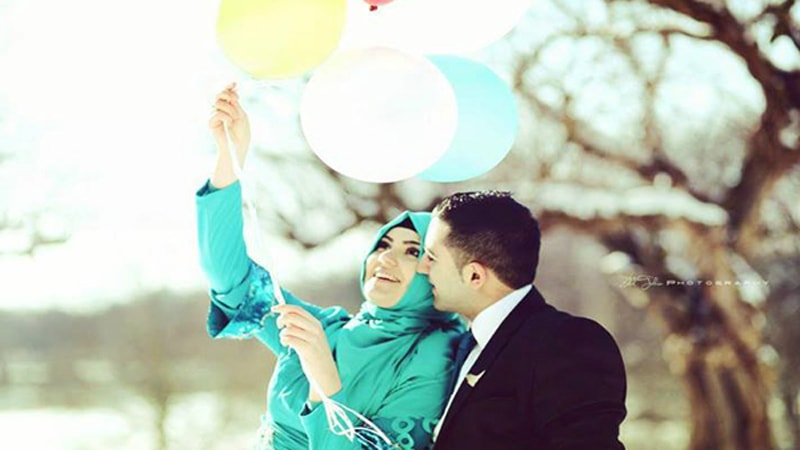

Why does Islam allow polygamy? Part 1
Today, one of the Islamic regulations that is the cause of many prejudgments about Islam in western countries is the law of polygamy in Islam. This practice refers to a form of marriage that allows a man to have two, three, or four wives at the same time, but, on the contrary, never ever allows a woman to have more than one husband simultaneously.
In this article, you will read the philosophy behind this law from different perspectives and finally see Islam’s recommendation on that.
Polygamy in the Other Abrahamic Religions
Polygamy was practiced long before Islam among different nations and was considered as an acceptable common deed in the history of some other faiths including Christianity and Judaism, although it is frowned upon and forbidden in their cultures now.
According to the Jewish encyclopedia: “While there is no evidence of a polyandrous state in primitive Jewish society, polygamy seems to have been a well-established institution, dating from the most ancient times and extending to comparatively modern days” [1].
In Christianity also, polygamy does not contradict their Scripture: “Nowhere in the New Testament is there any explicit commandment that marriage should be monogamous or any explicit commandment forbidding polygamy” [2].
Polygamy in Islam and the Quran
Islam did not invent the system of polygamy, neither did it ban this tradition which was practiced unlimitedly by Arabs. Instead, it restricted it to four wives and gave it specific conditions and terms.
It is explicitly stated in the Holy Quran that:
“If you fear that you may not deal justly with the orphans, then marry [other] women that you like, two, three, or four. But if you fear that you may not treat them fairly, then [marry only] one, or [marry from among] your slave-women. That makes it likelier that you will not be unfair” (4:3).
This verse was revealed in regard to the Arabs in the period of ignorance, who were seldom free from wars and fighting, and among whom death by killing was a common occurrence. So, there was always a great number of orphans and widows among them.
Usually, the leaders of tribes and people of power and influence took the orphan girls (with their properties) as wives and behaved with them unjustly. They would often turn them out after swallowing their property; the helpless girls would become poor; neither they had any money to live on, nor was there anyone willing to marry and maintain them. The Quran, then, has reproached those Arabs very severely for this evil habit and prohibited very strongly doing any injustice to orphans or devouring their property. Allah says in the previous verse:
“Give the orphans their property, and do not replace the good with the bad, and do not eat up their property [by mingling it] with your own property, for that is indeed a great sin” (4:2) [i].
On the whole, Allah urges them to be careful regarding the orphans, so much so that if they are afraid that they would not be able to treat the orphan girls equitably and therefore do not like to take them, wives, then they had better not marry them; instead they should marry other women- two, three or four [3].
Polygamy in the Islamic law, Jurisprudence
Both the Quran and Sunnah (the Prophet’s (PBUH&HP) and infallible Imams’(AS) tradition) clearly indicate the legitimacy of polygamy in Islam and most of Islamic Jurists and Scholars agree with that. It is noteworthy, however, that Quran’s recommendation to marry two, three, or four does not in any way imply an obligation; neither has it been seen as a necessity in any of the Islamic sects. Now we will shed light on the reasons why Islam did not absolutely abolish this tradition.
The Philosophy Behind Polygamy in Islam
There are two different stances among Muslim scholars about polygamy in Islam; some have denied it as a general Islamic law by saying that it was suited to that specific time -i.e., the time and occasion in which the verse (4:3) was revealed- in history. The others, on the other hand, make any attempt to defend this law by reasoning it and saying its benefits; some of their arguments are:
Men’s sexual desire is stronger and lasts longer than women’s.
Women are not capable of fulfilling men’s sexual desire fully because of the restrictions they have, viz. menstruation, pregnancy, menopause, etc.
There are usually more marriageable women than men due to women’s longer lifespan and men’s more frequent fatal casualties because of the dangerous incidents that happen to them, etc.
Among these reasons, the third one -if we suppose that it existed in the past or continues to be common in the present day- is of great importance in justifying polygamy in Islam. Not only that, but it creates a right in favor of women and duty and responsibility for men and society.
Clearly speaking, if, in any case, the number of women fit to be married exceeds the number of marriageable men, then a group of women would be left without husbands and would remain deprived of the right to family life, so the law restricting marriage to monogamy will be inconsistent with this natural right. Accordingly, it is only by the provision of the law of polygamy (of course with special conditions) that this natural right is revived.
What’s more, Islam disagrees with the belief that man is a born polygamist and that his nature is at variance with monogamy. Islam, also, is against the idea that loyalty is impossible for men, and that one woman is created for one man, and one man for all women.
Polygamy, in the Islamic perspective, rises from a social difficulty and is not due to the innate nature of men. If there did not exist in society the problem of an excess of the number of women in need of marriage over the number of marriageable men, the custom of polygamy would have ceased to exist or would have rarely existed [4].
Now read the second part of this article to see the Islamic restrictions on the law of polygamy in Islam.
References:
- polygamy
- Eugene Hillman, Polygamy reconsidered, p. 140
- polygamy in Islam
- Morteza Motahari, women and her rights in Islam, p. 146-147
Share This Article

The Importance of Marriage in Islam
“Allah made for you mates from your own selves and appointed for you children and grandchildren from your mates, and We provided you with all the good things. What, do they believe in falsehood while they deny the blessing of Allah?” (16:72)
If you are married, you might have experienced how a successful marriage plays an important part in our lives. Marriage in Islam is the cornerstone of the family and the only relationship that effectively prepares us for the community; so, if it is thought upon carefully and wisely, it will result in the well-being of the society as well as each individual.
Unlike some religious denominations that encourage celibacy as a means of salvation and great virtue, there is no monasticism in Islam [1]. Prophet Muhammad (PBUH&HP) says in this regard: “Marriage is my way (Sunnah), Whoever turns away from it is not ‘among my followers’” [2].
With regard to marriage in Islam, he has also stated: “There is no better structure founded in Islam other than marriage” [3].

The Purpose of Marriage in Islam
According to a narration from Prophet Muhammad (PBUH&HP), marriage in Islam is considered as half of a Muslim’s religion:
“One who marries has already fulfilled half of his religion, therefore he should fear Allah for the other half” [4].
What do you think the reason is? What are the important benefits to which marriage is linked?
Looking into it from different aspects, one might find various reasons for getting married, like money, popularity, religion, beauty, etc. But the religion of Islam focuses on the more spiritual aspect of this holy covenant, i.e., peace, security, and affection:
“And of His signs (God’s signs) is that He created for you mates from your own selves that you may take comfort in them, and He ordained affection and mercy between you. There are indeed signs in that for a people who reflect” (30:21).
The other aspects that make marriage in Islam a necessity in humans’ life are as follows:
Emotional Needs:
As mentioned in the verse of Quran above, marriage in Islam, in the most suitable way, is the source of emotional comfort to us. Quran also says:
“It is He (God) who created you from a single soul, and made from it its mate, that he might find comfort with her” (7:189).
When you get married, the first thing you promise your spouse is to care for her/him, to meet his/her emotional needs. That is what makes you fall in love with your life companion and lets the two of you experience love, affection, mutual understanding, peace of mind, and happiness.
Regarding this matter, Imam Sadiq (AS) has said:
“Whenever a man’s love for his wife increases, his faith increases in quality” [5].
Physical Needs (sexual desire):
Humans naturally possess a sexual instinct which is a significant and strong desire. Everyone feels the urge to have a partner for fulfilling their sexual needs in a safe and serene environment, which will help them grow and reach high levels of perfection and satisfaction.
Abstaining from marriage often results in physical and mental disorders. Doctors from Georgia State University in a study published in 2001 found that those who choose to be celibate are frequently afflicted with feelings of anger, frustration, self-doubt and even depression [6].
The religion of Islam not only recognizes the sexual needs of human but also strongly recommends marriage as the only legal way of fulfilling this desire.
The Social Needs:
Human beings are social creatures, who like all other beings, have urges which lead to starting a family of their own and reproduction. In this regard, Quran says:
“The originator of the heavens and the earth, He made for you mates from your own selves, and mates of the cattle, by which means He multiplies you…” (42:11).
Based on this verse, Children are the results of marriage in Islam that make the procreation of humankind continue. They also play an important role in stabilizing the family foundations. Islam gives a great deal of emphasis to both marriage and bringing up faithful and virtuous children since they are considered as building blocks of a healthy society.
Apart from that, marriage shields the whole society as well as every single individual from lots of evil deeds. It has been narrated from Prophet Muhammad that, when a person gets married at a young age, Satan will become angry since she/he has guarded two-third of his/her religion against him [7]. Married people are less involved in socially destructive acts like any extramarital affairs.

Self-purification
From the Islamic perspective, marriage is not merely a means of legalizing sexual relations. In fact, it unites the existence of the man and woman as a couple, brings them together and makes them complementary to each other.
The peaceful and secure environment that the husband and wife live in is the best place to practice self-control, selflessness, and self-purification. Pious couples always invite one another to goodness. They are also a source of encouragement in preventing each other from committing sins and performing the obligatory acts of worship, which eventually makes them have a respectable and honest life forever.
It has been narrated that once the Prophet (PBUH&HP) went to Imam Ali (AS)’s and Lady Fatimah (AS)’s house after their wedding. He asked Imam Ali (AS) how he found his spouse. Imam replied: “I found Zahra (AS) as the best help in worshipping the Almighty Allah.” The Prophet (PBUH&HP) then asked Fatimah al-Zahra (AS) the same question, and she replied: “He is the best husband” [7].
We learn from this narration that one of the main purposes of marriage is actually what Imam Ali (AS) has mentioned, i.e., serving Allah. When a man and a woman get married, the two become one. The bond between them mirrors the unconditional love between The Creator and us, and this is the ultimate experience a true believer always seeks to have.
References:
- Al-Qadi al-Nu'man, Daim al-Islam, v. 2, p. 193, h. 701
- Bihar al-Anwar, v. 103, p 220.
- Wasa 'il al Shiah, vol 14, p 3.
- Wasa’il ul-Shi’a, Vol. 14, p 5.
- Wasa’il, vol 20. p 24, H 24931.
- Navader (Ravandi), p 12.
- Bihar al-Anwar, vol 43, p 117.
Read More

Mutual Responsibilities in the Islamic Family
Getting married, yesterday’s girl and boy become today’s husband and wife; they form the most basic and important foundation in the society in which each of them is bound to perform certain duties. In this peaceful and calming bond, namely the Islamic family, no person is superior to the other, and no responsibility is more vital than the one of the other; they both form the pillars of a firm foundation and are two equal sides of a scale which hold it in balance. Nevertheless, there are some certain tasks in which both husband and wife should participate; Actually, mutual responsibilities which Islam emphasize are really easy.
Affability in Behavior in the Islamic Family
The very first duty that has been defined for husbands and wives mutually is affability in behavior [1]. In other words, they should act in a kind and respectful manner toward each other, speaking with dignity and affection, understanding each other’s needs and feelings, being ready to comfort one another in times of hardship, and sharing their joy in times of happiness. Also, they should consult in their affairs with each other and respect one another’s views and decisions.
Furthermore, honesty and faithfulness are among the most important characteristics that both husbands and wives should observe in their married life. They should try to be as open as possible to one another and avoid hiding things from each other. Otherwise, there may arise a feeling of suspicion and insecurity between them.
Cooperation and Mutual Responsibilities in the Islamic Family
Despite many misunderstandings, Islam does not consider housework the responsibility of women and condemns the men who force their wives to do so. On the contrary, Islam obliges both husbands and wives to participate in this task and help one another in doing it, rather than leaving the whole burden on the shoulder of one person only [i] [2]. They should also cooperate in upbringing their children and reach unity in their behavior and speech toward them so that the feeling of harmony and comfort will spread in the family.
Beautiful Appearance in the Islamic Family
Besides, for husbands and wives to be always attracted to one another in an Islamic family, both of them should appear as clean and beautiful as possible in front of each other [3] & [4]. For instance, they should wear the best clothes they have got, wear perfume, adorn their hair, etc.
As a result, the love between them will increase, and they will feel more secure. Also, when the need for physical attraction is satisfied in the private environment of married life, neither husband nor wife will feel the desire and urge to satisfy this need in other unlawful ways.
Finally, for a marriage to be successful and healthy and form the recommended Islamic family, both husbands and wives should attempt to do whatever is best to save this holy bond. For sure, this is not an easy job; it takes self-sacrifice, patience, hope, and optimism.
Regarding mutual responsibilities, you should know that you may sometimes feel tired, disappointed and hopeless but at the end of the day, when you look at your spouse, feel the love in him/her and think about the beautiful life that you can build with him/her, you will be surely willing to pay any expense to make this come true.
Notes:
[i]. Whenever Imam Ali – pbuh- found a chance and was free, would come and help his wife Fatimah- pbuh- in the housework. One day Prophet Muhammad came to their house and saw they were working together and asked:” Which one of you are more tired so that I take his/her place?”, Imam Ali –pbuh- answered: “ Fatimah is more tired.” Our kind prophet gave Fatima rest and continued her work himself[3].
References:
- (4:19)
- MirzaHossein Noori, Mustadrak al-Vasael, V.13, P.48.
- Morteza Motahari, Dastan-e- Rastan, V.2, P.252.
- Shaikh al-Hur al-Aamili, Wasail al-shiah, V.20, P.158.
- Muhammad ibn Ya‘qūb al-Kulaynīm, Usul al-Kafi, V.5, P.511.
Read More

